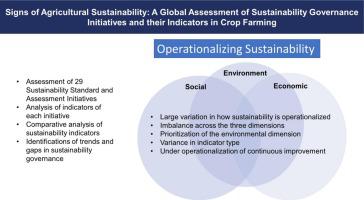Agricultural Systems ( IF 6.1 ) Pub Date : 2023-04-05 , DOI: 10.1016/j.agsy.2023.103658 Jason Konefal , Evelien M. de Olde , Maki Hatanaka , Peter J.M. Oosterveer

|
CONTEXT
To address sustainability challenges in agriculture, private and multi-stakeholder initiatives increasingly use sustainability indicators to monitor the sustainability impact of farms. These indicators can be part of standards for certification or assessment tools to measure farm performance. While these initiatives play an important role in navigating the sustainability transition, insight in how these governance initiatives operationalize sustainability in crop farming is lacking.
OBJECTIVE
This paper examines how private and multi-stakeholder governance initiatives, which increasingly regulate the sustainability of a sizeable portion of agriculture globally, operationalize the concept of sustainability. It provides understanding into which sustainability themes are commonly included in sustainability initiatives, and those that are not, which can give insight into the direction these initiatives are steering crop production worldwide.
METHODS
We developed an overview of governance initiatives using databases and existing research on sustainable agriculture initiatives. Documentation about these initiatives was gathered and used to systematically review descriptive and institutional characteristics of the 29 sustainability assessment and standard initiatives. Moreover, we analyzed the kinds of indicators (i.e., performance, practice, and target) and the themes that are prioritized in the environmental, social, and economic dimensions of sustainability.
RESULTS AND CONCLUSIONS
The analysis shows that the 29 initiatives are very diverse in their characteristics. While some specifically focus on one crop or country, others operate across production chains and at a global scale. Within specific sectors or countries, certain standards are quite influential, for instance, the Better Cotton Initiative covers 22% of global cotton production, while in Ireland, 70% of horticulture farmers are Origin Green certified. Globally, 2% of the crop land is certified under one of the 14 standards that reported land use. Our analysis of sustainability themes show an imbalance across environmental, social, an economic sustainability, with environmental sustainability being prioritized. In particular, social themes such as quality of life, food sovereignty and fair trading practices were less often included (38, 24 and 21% respectively).
SIGNIFICANCE
Sustainability standard and assessment initiatives govern a substantial and growing portion of global cropland. They play a central role in determining what is considered sustainable and thereby influence which farming practices are applied worldwide. The impact of these initiatives is likely to continue to grow as sustainability assessments and standards become more widely adopted. In examining a large sample of standard and assessment initiatives, this study presents a comprehensive overview of the current state of sustainability indicators for crop farming globally.
中文翻译:

农业可持续性的迹象:对作物种植业可持续性治理举措及其指标的全球评估
语境
为了应对农业中的可持续性挑战,私人和多方利益相关者倡议越来越多地使用可持续性指标来监测农场的可持续性影响。这些指标可以成为衡量农场绩效的认证或评估工具标准的一部分。虽然这些举措在引导可持续性转型方面发挥着重要作用,但缺乏对这些治理举措如何在作物种植中实施可持续性的洞察力。
客观的
本文研究了越来越多地规范全球相当大一部分农业的可持续性的私人和多方利益相关者治理举措如何实施可持续性概念。它有助于了解哪些可持续性主题通常包含在可持续性倡议中,哪些不包含,从而可以深入了解这些倡议在全球范围内引导作物生产的方向。
方法
我们使用数据库和有关可持续农业计划的现有研究对治理计划进行了概述。收集了有关这些举措的文件,并用于系统地审查 29 项可持续性评估和标准举措的描述性和制度特征。此外,我们分析了指标的种类(即绩效、实践和目标)以及在可持续性的环境、社会和经济维度中优先考虑的主题。
结果和结论
分析表明,这 29 项举措的特点非常多样化。有些专门针对一种作物或国家,而另一些则跨生产链并在全球范围内运作。在特定行业或国家,某些标准具有相当大的影响力,例如,Better Cotton Initiative 覆盖了全球 22% 的棉花产量,而在爱尔兰,70% 的园艺农民获得了 Origin Green 认证。在全球范围内,2% 的农田根据报告土地使用的 14 项标准之一进行了认证。我们对可持续性主题的分析表明,环境、社会和经济可持续性之间存在不平衡,环境可持续性被优先考虑。特别是生活质量、粮食主权和公平贸易实践等社会主题较少被包括在内(分别为 38%、24% 和 21%)。
意义
可持续性标准和评估举措管理着全球大部分且不断增长的农田。它们在确定什么被认为是可持续的方面发挥着核心作用,从而影响在世界范围内应用哪些耕作方式。随着可持续性评估和标准得到更广泛的采用,这些举措的影响可能会继续扩大。通过检查大量标准和评估计划样本,本研究全面概述了全球作物种植可持续性指标的现状。











































 京公网安备 11010802027423号
京公网安备 11010802027423号